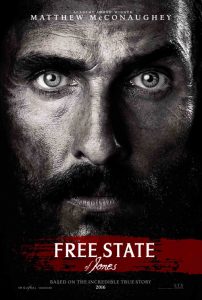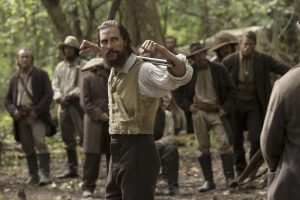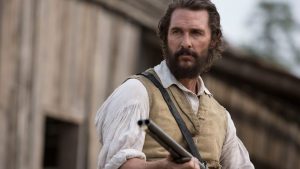
“Free State of Jones” is the film equivalent of a book report written by a teenager more interested in the battles then the reasoning behind them. Seeing as how the teenager wants a good grade, they’ll supplant the report with tidbits of information. These tidbits prove the writer did their research, albeit minutely so. “Free State of Jones” is historically accurate, don’t get me wrong, but only because the metaphorical report demands it so.
The first half of the film feels like a struggle for writer/director Gary Ross. It’s all setup for the uprising of Newton Knight (Matthew McConaughey) and his army of the poor. His initial reasoning is to fight for the poor and take from the rich who had taken from them. This slowly morphs into the fight for equal rights, leading towards the titular Free State of Jones. Once Ross reaches that point, he feels more comfortable in his surroundings. The well-choreographed battles take center stage, then are usurped the political warfare revolving around the Emancipation Proclamation. This is what Ross is most interested in, which is why it’s more dramatically sound.

The journey to the Free State is so rocky that it almost loses the viewer for good. Events occurs to abide by history, with Leonard Hartman’s story acting as Ross’ bibliography. Newton Knight loses his son in the civil war in the opening of the film, but this comes across as nothing more than a mere plot device. He doesn’t seem emotionally devastated by his loss, but more irritated. Newt’s son’s death acts as a catalyst for his rebellion and less so emotional torment. Characters die because that’s inherently sad and factual. Slaves are treated as such because that’s inherently sad and factual. Common folk lose ninety percent of their land to the rich because that’s inherently sad and factual. Everything occurs because it’s a necessary evil for the teenager to get to the battles in which he’s interested in.
Once the second half arrives, the film’s power magnifies. The battle sequences are well thought out, with Ross having a keen observation for wartime strategy. This is because, as the proverbial teenager, he is fascinated by the war more so than anything else. This is where his passion comes out and is the part where the report shines the most. The historical accuracies are anchored heart, as the teenager now fully cares about the events. The harrowing drama that he was speaking of is now felt because he now feels it.

This in turn causes the drama in the second half to connect. Newton seems more driven, with his struggles feeling more painful. He seems more distraught over the hanging of the young men in his army than he did his own son, the reasoning being the teenager finds it more heartbreaking. The teenager was able to understand the severity of the son’s death, but didn’t spend any time with him to get emotionally attached. The young army men are encased in the focal point of his intrigue, therefore their deaths resonate stronger. This is also why Newt’s forbidden romance with Rachel (Gugu Mbatha-Raw), a slave, is more pronounced than his marriage to his wife, Serena (Keri Russell).
Even the plight of the slaves comes off as more emotionally driven in the second half. Their war for freedom reached its boiling point in the civil war, which is where the teenager got a better understanding of it. While the final act, completely dealing with the political battles surrounding the Emancipation Proclamation’s fallout, isn’t as potent as the physical war, it’s more compelling than the first act. The teenager finds it more compelling, in turn causing the direction to find it more compelling.

After a while, Ross gives up on the attempt at showcasing the historical accuracies, denoting them to mere crawls of text. This is usually a cheap way of moving the story along without having to invest in it, but I found that approach more complementary to Ross’ direction. It doesn’t feel as hackneyed as the expository dialogue and still gets the point across. It also helps in bypassing the smaller details the teenager provides to prove he’s done his research, such as the runaway slaves burning a fire inside of a tree as to trap the smoke from going into the air, revealing their location. It would also aid in axing the legal battle in which Newt’s third son is engulfed in over the discovery of his heritage. Those court hearings, taking place decades after the civil war, are awkwardly shoehorned in via cutaways throughout the film, serving no real purpose other than to show the ripple effects caused by Knight’s actions.
Ross is more concerned with the overall aspects of the story, not the small details and the buildup. Had he utilized the crawls of text throughout, his direction would’ve been tighter. Some would still find the approach too superficial, but it would’ve been more true to Ross’ vision. The second half of “Free State of Jones” is true to his vision, and is enough to make the film worthy of a slight recommendation.
Final Rating: B-
